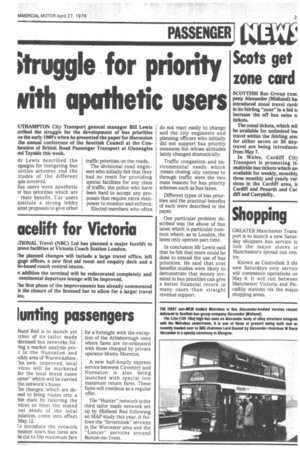itruggle for priority with apathetic users
Page 25

If you've noticed an error in this article please click here to report it so we can fix it.
!UTHAMPTON City Transport general manager Bill Lewis wribed the struggle for the development of bus priorities ice the early 1960's when he presented the paper for discussion the annual conference of the Scottish Council at the Conleration of British Road Passenger Transport at Gleneagles tel Tayside this week.
4r Lewis described the npaigns for instigating bus orities schemes and the itudes of the different )ple involved.
3us users were apathetic ar bus priorities which are their benefit. Car users nstitute a strong lobby ainst proposals to give other traffic priorities on the roads.
The divisional road engineers who initially felt that they had no remit for providing special facilities for any class of traffic, the police who have been hard to accept any proposals that require extra manpower to monitor and enforce.
Elected members who often do not react easily to change and the city engineers and planning officers who initially did not support bus priority measures but whose attitudes lately changed dramatically.
Traffic congestion and environmental needs which meant closing city centres to through traffic were the two main reasons for bus priority schemes such as bus lanes.
Different types of bus priorities and the practical benefits of each were described in the paper.
One particular problem described was the abuse of bus lanes which is particular common where, as in London, the lanes only operate part time.
In conclusion Mr Lewis said that he felt that more could be done to extend the use of bus priorities. He said that cost benefits studies were likely to demonstrate that money invested in bus priorities can give a better financial return in many cases than straight revenue support.
















































































































































